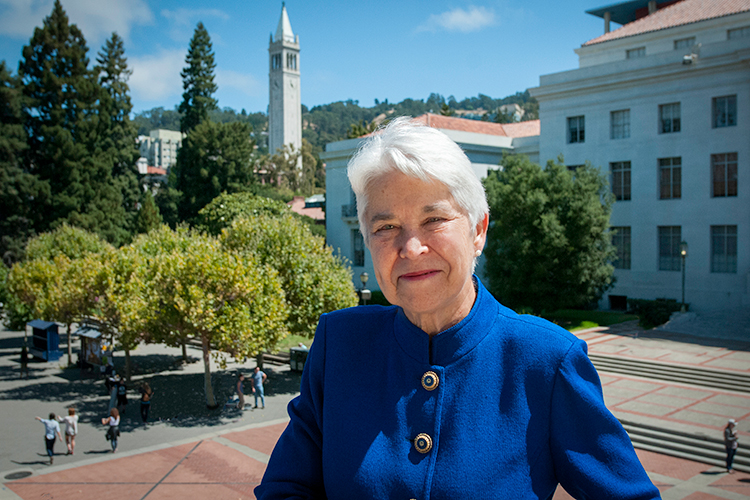Lots to celebrate, lots to work on, Carol Christ says in semesterly update
UC Berkeley Chancellor Carol Christ took questions from students, staff and faculty at this week's end of the year Campus Conversation.

December 6, 2022
UC Berkeley has a lot to celebrate and a lot to work on moving into the new year, Chancellor Carol Christ said during a virtual, end-of-semester Campus Conversations event on Tuesday. But through another tumultuous semester — which has seen a UC-wide labor strike and a continuing pandemic — Berkeley’s campus community has again come together.
Christ acknowledged the campus community Tuesday for all it has accomplished and for its continued resilience this past year as spring semester approaches.
“I hope we all take the time over the break to relax and recharge to be with family and friends, and have a wonderful holiday season,” she said. “And thank you for everything you do for Berkeley.”
Tuesday’s wide-ranging discussion also touched on progress and challenges in Berkeley’s infrastructure, fundraising goals and student housing projects. Christ also noted how shifts in the Pac-12 can impact funds the campus receives through its athletic teams, and how college rankings can misrepresent universities.
‘We’re not doing a victory lap’
A major highlight of this year, Christ said, was hitting the $6 billion fundraising goal for Berkeley’s “Light the Way” campaign, the largest fundraising campaign in the campus’s history.
The campus community met the goal 14 months earlier than expected, which surprised Christ, given that the campaign was launched during the beginning of the pandemic.
“But the pandemic seemed to increase people’s philanthropy,” said Christ.
She attributed that increase in giving to wealth that was created for some very rich segments of society, and to how the pandemic made people more conscious of their mortality and the suffering of others. The important role that universities had in COVID-19 medical research, vaccines and epidemiological work also helped contribute to that philanthropy, she said.
Christ said almost no gifts were for general discretionary purposes, but given instead to fund specific needs across campus.
Gifts for undergraduate scholarships reached Berkeley’s $400 million goal, and funds to support the Basic Needs Center and diversity, equity and inclusion initiatives on campus were also gifted more than before.
While the campaign’s total fundraising goal has been reached, the campus is still hoping to raise more money for graduate student fellowships and for faculty positions that have not yet been funded.
“[So], we’re not doing a victory lap,” said Christ. “We’re doubling down in areas where we still have a way to go.”
A lack of infrastructure funds
While the success of the $6 billion campaign may make it seem like Berkeley is swimming in the dough, Christ reminded viewers Tuesday that Berkeley still has an $8.6 billion need to fund seismic retrofitting and deferred maintenance needs across campus.
Departmental review committees all have reported a need for building maintenance projects, said Christ. While it is evident that state funding for these building projects has been on the decline since 2006, Christ said she aims to find income streams that the campus can control and create dedicated funds from them for this deferred maintenance.
“It’s not going to be equal to the need, which is huge,” Christ said. “But at least we can start chipping away at the problem.
A current building project that has been a point of contention this year is the People’s Park Housing Project, which is currently halted by an injunction from a California Court of Appeal.
Christ said she is “deeply committed to the project,” which aims to provide a residence hall with 1,000 student housing apartments and an additional 125 apartments and 185 beds for permanent supportive housing for low-income and/or formerly unhoused tenants. Additionally, almost half the site will memorialize the history of the park.
Other projects are moving forward in the new year to combat student housing issues, Christ said, like the Anchor House residence hall that will provide housing for over 770 transfer students. In the spring, Berkeley will also break ground on 770 graduate student apartments in University Village in Albany, and a separate housing unit will be built in Emeryville for graduate students.
“What we’re trying to do is increase the amount of campus-built and -managed housing for every element of our campus community,” said Christ. “We can’t have much of an impact on the housing market, but what we can do is build more housing, which is what I’m trying to do.”
The strike
Christ also took questions and shared reflections about the UC-wide labor strike’s impact on the semester.
Tentative agreements have been made with post-doctoral scholars and academic researchers, and Christ said negotiations with graduate students are currently underway.
While faculty and students have adapted to the absence of graduate students in their courses, Christ said “it’s still not the same” without them.
“Graduate students are essential partners in the pedagogical enterprise for our undergraduate students,” she said. “So, their education has been harder in the last part of this semester. But we’re trying the best we can.”
Christ said she witnessed incredible joy seeing the campus community come back together, in person, this past semester. She added that the pandemic has led the campus to adopt new and productive ways of utilizing digital communication tools and that, in some facets of academic life, Berkeley is nearly back to normal.
But she stressed that COVID-19 is an endemic disease that we must learn to live with, moving forward.
“I don’t think the pandemic will ever be in the rearview mirror,” she said. “We still haven’t come to terms with the psychological impact of the pandemic. … All of our relationships have been changed by this experience, and we have so much repair work to do and building community to do.”